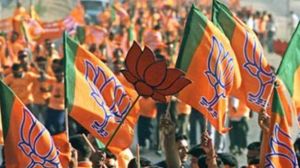Grain of truth
Be fiscally seriousThe overall performance of the economy has been good and India can look forward to its economic future with a degree of...

Be fiscally serious
The overall performance of the economy has been good and India can look forward to its economic future with a degree of confidence. However its fiscal crises stop it from doing better and is also beginning to affect performance.
In agriculture the main initiatives are with the farmer and yet without the proper economic environment and infrastructure there is not much that he can do. In the social sector this is more so and the state is important. The fiscal crisis of the Indian state is unimaginable to most of us in its intensity. There is a great element of wishful thinking as we approach the Budget day.
It is high time we took the 8220;fisc8221; seriously. The first thing to accept, before we start talking sense, is that every political party in India is squarely responsible for the rot. This is important to accept, because there will be a lot of holier-than-thou talk, once the Economic Survey and the Budget are out.
The media love this crosstalk, but all of it is sanctimonious humbug. Since 1994-95 each one of the Budgets has been aimed at elections and short-term political gains have ruled the roost. In 1998-99, the combined revenue deficit of the Centre and the states was precisely 7.74 per cent of GDP, just a little more than double the level of 3.35 per cent in 1992/93. By the time you read this the Economic Survey will be out and the 1999-2000 figure will be worse. India now has the dubious distinction of being the worst fiscally governed of the major countries of the world.
There has to be a ban on promises made in dream Budgets, promises which are not ke-pt. Eighty per cent of the Central go-vernment8217;s expe-nditure is on sa-laries, subsidies, pensions, interest and defence. Th-irty-five per cent of the state government8217;s expenditure was on investment and ca- pital in 1970-71. It is now 17.8 per cent. The government simply doesn8217;t spend on people any more. The different political parties only talk of doing so.
When I was power minister I remembered telling any PSUs that I forbid any picture of mine being printed in newspapers at public expense. As we spend less on development, more pictures of inaugurations are published. It has reached the comical levels that pictures of VVIPs come inaugurating bus stands, cafeterias and reservation kiosks.
Fortunately, the country8217;s economy is doing well and so there is an element of hilarity to the emperor without his cl-othes, but there is the downside. State governments joining the freeloaders is a recent trend. But they are now doing it with a vengeance. The states promis-ed in the Ninth Pl-an that their plan expenditure would be met by roughly half borrowings and half central assistance. They we-re going to meet non-plan expenditure from their own resources. In the first three years they have deficits on revenue half th-eir development expenditure, so they have borrowed tw-ice as much.
Gujarat and Karnataka were the only two states not in the red. Now Gujarat has also gone down under.
Government and leaders in civil society have to initiate steps towards political conventions to take stock of the situation and introduce remedial measures. The first thing to do is to accept the seriousness of the situation and to introduce frugality in government expenditure. The second is to highlight that freewheeling subsidies do not help the poor and are in many cases just loot by the privileged. Milk, which was subsidised in Delhi, is not consumed by the one out of twelve families which go to bed hungry in India, and neither is cooking gas.
Subsidies have to be very carefully designed and targeted. When it is in the economic field government must work out the efficiency price of its products and then charge them. If it cannot produce at efficient prices, it must get out of that area.
The notion that taxes are just a passing activity we occasionally indulge in has to go and if the state has to perform functions, which are very necessary and no one else will do them, they have to be paid for. There are a number of activities required to keep up a flow of private and community investment. They are being neglected, because the state does not have the money. India is not short of 8220;foreign exchange8221; and resources from abroad.
It is short of its own efforts to garner larger investments. This is true of infrastructure and of policies. A lower interest rate is required to make the final plunge into convertibility and economic independence, but the treasury imperative of borrowing stands in the way. The software and information boom is not a bubble, for it is based on the fundamentals of investment in knowledge we had made in the past and the policies we have followed. But without complementary investments and reform, it will not be a source of growth forever.
The much berated CSO has given us the warning that Gross Domestic Savings have gone down from 24.7 per cent of GDP in 1997-98 to 22.3 per cent in 1998-99 and the gross domestic investment rate from 26.2 per cent in 1997-98 to 23.4 per cent in 1998-99. The Economic Survey, if it does its job, should raise a shindy about this, for it has happened after decades.
- 01
- 02
- 03
- 04
- 05































